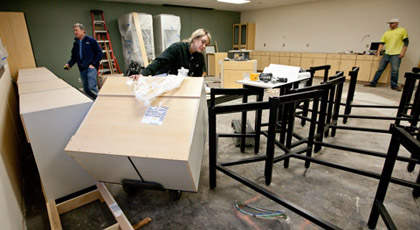Page 12 • (1,172 results in 0.014 seconds)
-
Department of Biology faculty and staff.
Angelia Alexander Professor Emeritus of Biology Full Profile 253-535-7475 alexanag@plu.edu
-
Department of Biology faculty and staff.
Amanda Harris Lab Manager Full Profile 253-535-7781 harrisaj@plu.edu
-
Department of Biology faculty and staff.
Teresa Horm Visiting Assistant Professor Full Profile 253-535-7081 thorm@plu.edu
-

Audrey Borloz ’24, Fani del Toro ’24, Aidan Donnelly ’25, Grady Lemma ’25, and Angela Rodriguez Hinojosa ’24 spent the summer focused on synthesizing organic compounds called antenna ligands for lanthanide ions. When these molecules interact with specific ions like europium(III) or terbium(III), they exhibit…
, which provides insights into molecular structures, chromatography for separating components, and photoluminescence spectroscopy to decipher the luminescent properties. (PLU Photo / Sy Bean) November 8, 2023 By MacKenzie Hines and Ava EdmondsMarketing and Communications Audrey Borloz ’24, Fani del Toro ’24, Aidan Donnelly ’25, Grady Lemma ’25, and Angela Rodriguez Hinojosa ’24 spent the summer focused on synthesizing organic compounds called antenna ligands for lanthanide ions. When these molecules
-

Associate Professor | Department of Computer Science | caora@plu.edu | 253-535-7409 | My research interest is mainly focused on developing and applying machine learning and data mining techniques to solve biomedical problems, such as human genome data analysis and protein structure predictions.
, 2008 Areas of Emphasis or Expertise Machine learning Data science Bioinformatics Selected Presentations 23rd International Conference on Intelligent Systems for Molecular Biology (ISMB), Large-Scale Model Quality Assessment for Improving Protein Tertiary Structure Prediction (2015) The 5th International Conference on Wireless Communications Networking and Mobile Computing, WiCOM, Apply Modified Method of Nonlinear Optimization to Improve Localization Accuracy in WSN, Beijing (2009) Selected
Office HoursMon: 10:00 am - 2:00 pmMon - Fri: - -

New biology lab an interactive plus for students By Barbara Clements The lab tucked in the north side of the Rieke Science Center is all about drywall, dust and stacks of cabinets right now. But come spring semester, the new Louis and Lydia Sheffels Biology…
January 14, 2011 New biology lab an interactive plus for students By Barbara Clements The lab tucked in the north side of the Rieke Science Center is all about drywall, dust and stacks of cabinets right now. But come spring semester, the new Louis and Lydia Sheffels Biology Laboratory, otherwise known as Room #136, will open up to new work stations and new equipment. Louis and Lydia Sheffels Biology Laboratory will open up to new work stations and new equipment. (Photo by John Froschauer) The
-

Have you ever wondered how the ocean’s tiniest inhabitants play a significant role in shaping our world? Marine microorganisms, minuscule life forms, wield a vital influence over our planet’s climate. They manage crucial components like carbon and oxygen within the vast oceans and the atmosphere.…
are, which is a direct representation of their growth. Through methods like this, we can track how well our cultures are growing!” (PLU photo / Sy Bean) Ryan Fisher ’24Biology major and environmental studies minor “This summer has been such a great experience in research,” said Fisher. “In our lab, I got to practice a lot of different chemistry and biology-based methods to understand marine microbes on a molecular level.” “One of my absolute favorite parts of research has been the actual process
-
Summer Research in Computational Biology at the University of Pittsburgh Students will receive classroom training in topics pertinent to the emerging field of computational biology, such as computational structural biology, cell and systems modeling, computational genomics, and bioimage informatics, in addition to a wide variety…
TECBio REU at University of Pittsburgh Posted by: nicolacs / December 11, 2019 December 11, 2019 Summer Research in Computational Biology at the University of Pittsburgh Students will receive classroom training in topics pertinent to the emerging field of computational biology, such as computational structural biology, cell and systems modeling, computational genomics, and bioimage informatics, in addition to a wide variety of theoretical and experimental research projects. Students will
-

Have you ever wondered how the ocean’s tiniest inhabitants play a significant role in shaping our world? Marine microorganisms, minuscule life forms, wield a vital influence over our planet’s climate. They manage crucial components like carbon and oxygen within the vast oceans and the atmosphere.…
are, which is a direct representation of their growth. Through methods like this, we can track how well our cultures are growing!” (PLU photo / Sy Bean) Ryan Fisher ’24 Biology major and environmental studies minor “This summer has been such a great experience in research,” said Fisher. “In our lab, I got to practice a lot of different chemistry and biology-based methods to understand marine microbes on a molecular level.” “One of my absolute favorite parts of research has been the actual process
-
The mission of the PLU Chemistry Department is to provide high quality educational programs for all students who study chemistry at PLU.
“This summer has been such a great experience in research,” said Fisher. “In our lab, I got to practice a lot of different chemistry and biology-based methods to understand marine microbes on a molecular level.” Unlocking the Magic of Colloidal Nanocrystals Research students examine how liquids and tiny particles affect nanocrystal growth, mastering the art of precise material-making. From Oxford to Oaxaca, Jackie Lindstrom '23 uses math to understand migration. Jackie worked with Oxfam and a
Do you have any feedback for us? If so, feel free to use our Feedback Form.


